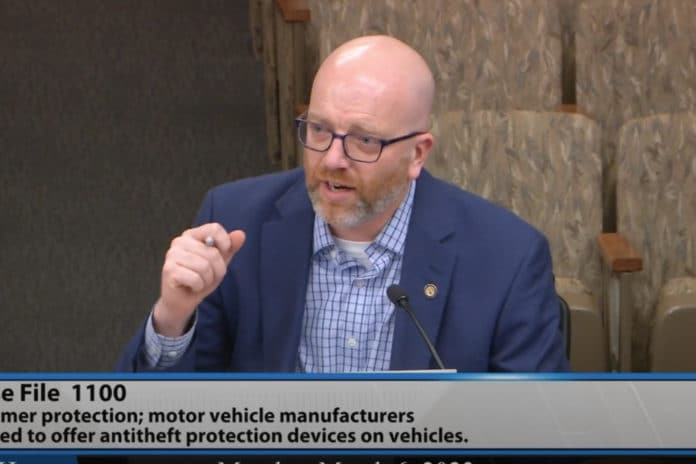
A DFL legislator who has introduced a bill that would require automakers to install antitheft devices in cars older than a decade was called out by Republicans in a House committee hearing Monday who say his proposal scapegoats businesses for out-of-control crime in Minneapolis.
Rep. Brad Tabke, DFL-Shakopee, is authoring HF1100, which would require automobile manufacturers to offer to install at no cost to the consumer an authorized antitheft protection device on all motor vehicles manufactured without an immobilizer after Jan. 1, 2013. A similar bill was just drawn up in the Senate and has not received a hearing.
While the language of the proposed legislation doesn’t mention specific automakers by name, Tabke told his colleagues in the House Commerce Committee on Monday that the impetus of the bill is to curb thefts of Kia and Hyundai vehicles, which he says have been stolen at a significantly higher rate than other makes of vehicles over the last year in Minneapolis and surrounding cities because so many don’t have working antitheft devices.
“These two automakers, specifically, instead of doing that (including antitheft devices), they chose to cut costs and make savings, throughout the 2000s and up until the last few years,” Tabke said, adding that in Minneapolis alone, thefts of Kia and Hyundai vehicles were up more than 800 percent in 2022 over the previous year.
“The reason Kias and Hyundais are being targeted is because [many of them] are missing anti-theft devices in the vehicles,” Tabke said.
Republicans in the committee scoffed at the bill, saying that it was just an echo of a public relations campaign over the weekend orchestrated by Minneapolis and St. Paul mayors Jacob Frey and Melvin Carter and Attorney General Keith Ellison to blame a spike in automobile thefts on specific automakers rather than address a continued policing shortage in Minneapolis. The bill passed in the committee on a party-line vote and is now headed to the House floor.

“I didn’t even know we were going to be hearing a bill on this,” said Rep. Anne Neu Brindley, R-North Branch. “I did see Mayor Frey’s tweet over the weekend that manufacturers must be held accountable, which is frankly, a bizarre take.”
Tabke defended his introduction of the bill and said the proposed legislation had been “in the works for awhile.”
“It just was a coincidence that both mayors and [Attorney General Ellison] did their piece and this bill was coming forward at the same time in this hearing today,” Tabke said.
Ellison then announced on Tuesday that he is opening a civil investigation into Kia and Hyundai to determine whether they have violated “Minnesota’s consumer protection and public nuisance laws.”
Heated debate about role police shortage has played in spike in vehicle thefts
Neu Brindley then exchanged words with House Commerce Committee Chair Rep. Zack Stephenson over whether the fact that Minneapolis is still more than 300 law enforcement officers below what’s required by its own charter is relevant to debate over the bill.
“We’re not going to go into a big discussion about the city of Minneapolis’ police count,” said Stephenson, DFL-Coon Rapids. “That’s just very far afield” from the nature of the bill.
Neu Brindley then countered that the city of Minneapolis’s support of the bill demonstrated a “complete lack of accountability” for the auto theft problem created by a self-induced police shortage.
“[The Minneapolis City Council] have decimated their police force and now we are going to hold manufacturers liable for those problems,” Neu Brindley said. “This is a very strange piece of legislation that should very obviously be voted against.”
Representatives for the automotive industry testified in opposition to the bill, saying that while manufacturers are already working with consumers to address issues related to vehicles that do not have working antitheft devices, states are not the proper venue to mandate design requirements for automobiles.
“If individual states mandate vehicles systems and designs, the industry would be faced with an unworkable patch of requirements that would bring the industry to a halt,” said Patrick Hines, an attorney with Twin Cities-based Messerli and Kramer, who testified on behalf of the Alliance for Automotive Innovation. “Having said that, it doesn’t mean that the automakers are not responding to the serious issues raised here by the bill.”
Hines said that manufacturers are already offering free antitheft software upgrades to drivers of affected vehicles, as well as reimbursements to drivers who purchase steering wheel locks for certain makes and models.
Rep. Kurt Daudt, R-Crown, said consumers know what features are on a vehicle when they buy it and that state government should be focused on providing public safety.
“Trying to hold an automobile manufacturer accountable for [a rise in] thefts of vehicles is the silliest thing I’ve ever heard,” Daudt said.
Hank Long
Hank Long is a journalism and communications professional whose writing career includes coverage of the Minnesota legislature, city and county governments and the commercial real estate industry. Hank received his undergraduate degree at the University of Minnesota, where he studied journalism, and his law degree at the University of St. Thomas. The Minnesota native lives in the Twin Cities with his wife and four children. His dream is to be around when the Vikings win the Super Bowl.














